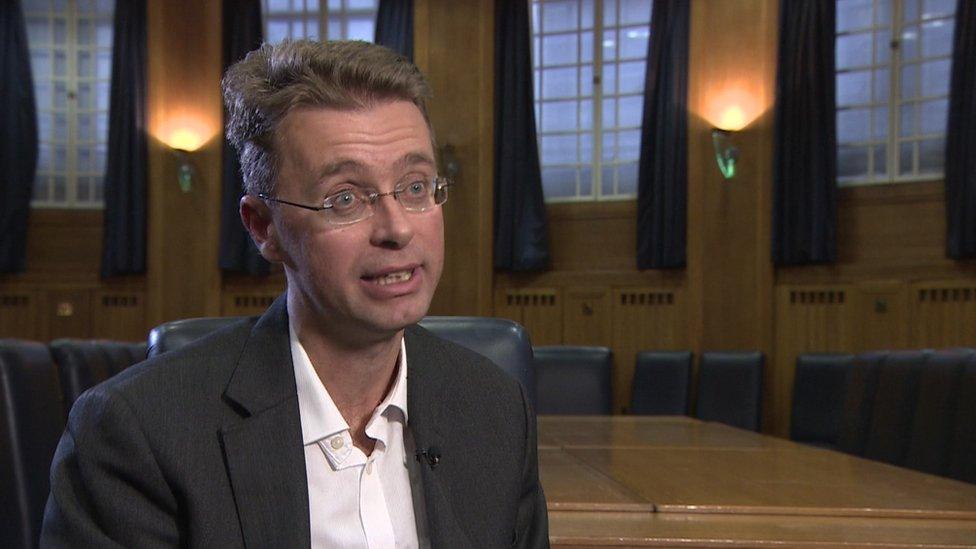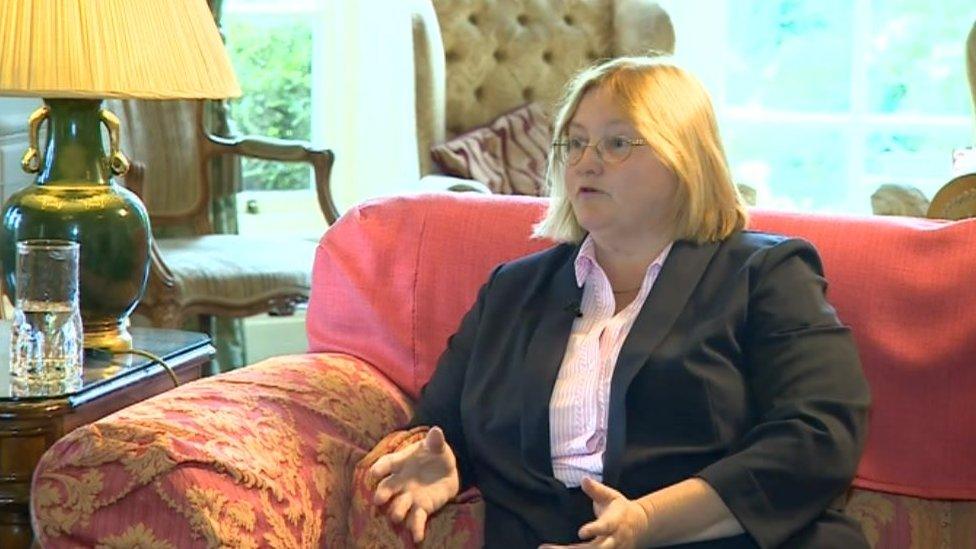Sacked vegan claims discrimination in landmark case
- Published
Jordi Casamitjana campaigns to encourage others to become vegans
A tribunal is to be asked to decide whether veganism is a "philosophical belief" akin to a religion, in a landmark legal action.
Jordi Casamitjana says he was sacked by the League Against Cruel Sports after disclosing it invested pension funds in firms involved in animal testing.
He claims he was discriminated against, and the tribunal will now decide if veganism should be protected in law.
The League Against Cruel Sports says he was dismissed for gross misconduct.
It denies the sacking was because of his veganism.
Mr Casamitjana says he is an "ethical" vegan.
"Some people only eat a vegan diet but they don't care about the environment or the animals, they only care about their health," he told the BBC.
"I care about the animals and the environment and my health and everything.
"That's why I use this term 'ethical veganism' because for me veganism is a belief and affects every single aspect of my life."
Plant-based
Dietary vegans and ethical vegans both eat a plant-based diet.
However, ethical vegans try to exclude all forms of animal exploitation, for instance avoiding wearing or buying clothing made from wool or leather, or toiletries from companies that carry out animal testing.
They may refer to "companion animals" rather than "pets", and will avoid zoos or other environments where they consider animals are exploited.
Mr Casamitjana worked for the animal welfare charity the League Against Cruel Sports and claims that, to his surprise, he discovered it was investing its pension funds in companies that carried out animal testing.
He says he drew this to the attention of his managers.
When nothing changed, he informed other employees and was sacked as a result.
He is now bringing a legal case, claiming he was discriminated against on the basis of his vegan belief.
'Factually wrong'
In a statement, the League Against Cruel Sports said: "Mr Casamitjana was dismissed from his position because of gross misconduct.
"To link his dismissal with issues pertaining to veganism is factually wrong.
"Mr Casamitjana is seeking to use his veganism as the reason for his dismissal. We emphatically reject this claim."

Mr Casamitjana supports a range of ethical and animal rights causes
However, in a hearing next March, an employment tribunal will, for the first time, determine whether veganism is a "philosophical belief" protected by law.
If the tribunal decides that it is, the discrimination claim will proceed to a full trial.
"Religion or belief" is one of nine "protected characteristics" covered by the Equality Act 2010, external.
The others, all ranked equally, are:
age
disability
gender reassignment
marriage and civil partnership
pregnancy and maternity
race
sex
sexual orientation
It is unlawful for an employer to discriminate directly, by treating an employee less favourably than others because of their religion or belief.
Harassment and victimisation on grounds of religion or belief are also unlawful, as is indirect discrimination, by applying a criterion or practice that disadvantages employees of a particular religion or belief unless there is an objective justification.
To qualify as a philosophical belief, veganism must:
be genuinely held
be a belief as to a weighty and substantial aspect of human life and behaviour
attain a certain level of cogency, seriousness, cohesion and importance
be worthy of respect in a democratic society, not be incompatible with human dignity and not conflict with the fundamental rights of others
be a belief, not an opinion or viewpoint based on the present state of information available
If Mr Casamitjana succeeds in his hearing, the consequences for vegans could be life-changing.
His solicitor, Peter Daly, of Bindmans LLP, said: "If we are successful, we will achieve a judgment which formally recognises the protected status of ethical veganism and which could then be used as the basis to combat discrimination against vegans in employment, in the provision of goods and services, and in education.
"This is therefore a landmark case."
But Nick Spencer, from the think tank Theos, which stimulates debate about religion in society, external, warns of dangers in unrestricted recognition and legal protection of people's beliefs.
"The irony in all this is that rights are intended to be liberating but if we're all turned into rights bearers, my rights clashing with your rights, we end up having to appeal to the courts to sort out our differences and that can become oppressive for everybody," he said.

Clashing rights could become "oppressive", warns Nick Spencer, of Theos
Figures from the Vegan Society, which supports Mr Casamitjana, suggest veganism is on the rise.
The society says there are currently 600,000 vegans in Britain, external, up from about 150,000 in 2014. It bases its estimate on surveys from the Food Standards Agency, Ipsos Mori and the National Centre for Social Science Research. , external
"For many people, veganism is a deeply held belief," says Louise Davies, Vegan Society head of campaigns, policy and research.
"This could be a landmark ruling that will not only recognise the validity and importance of veganism but also confirm that the needs of vegans in their employment and their everyday lives must be taken seriously."
Mr Casamitjana says he has been discriminated against many times because of his vegan beliefs.
He said: "It is important for all the vegans to know that if they want to talk about veganism, they are protected and no-one will say 'Shut up'.
"It is important that the law protects vegans."
- Published20 November 2018

- Published20 December 2017

- Published14 December 2017
